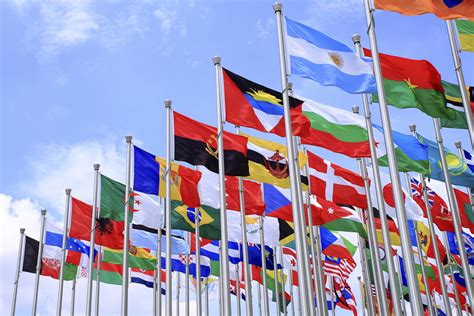Columbia University, a renowned global leader in higher education, is home to an exceptional International Relations program that has shaped generations of scholars, diplomats, and policymakers.

A Legacy of Excellence
Since its inception in the early 20th century, Columbia’s International Relations program has been at the forefront of academic inquiry and practical policymaking. With a commitment to interdisciplinary research, rigorous analysis, and a dedication to global engagement, the program has consistently ranked among the top in the world.
Core Strengths
Columbia’s International Relations program boasts several core strengths that distinguish it from its peers:
-
Faculty Expertise: The program brings together a distinguished faculty of scholars from diverse fields, including political science, law, economics, sociology, and history, ensuring a comprehensive understanding of international relations.
-
Research and Scholarship: Columbia is a major center for cutting-edge research in international relations. Faculty members are actively engaged in groundbreaking work that informs global debates on topics such as climate change, conflict resolution, and international security.
-
Global Network: The program maintains a vast network of partnerships with universities, research centers, and governments worldwide, providing students with unparalleled opportunities for field research, internships, and career advancement.
-
Diverse Student Body: With students representing over 100 countries, Columbia’s International Relations program fosters a vibrant and inclusive learning environment where diverse perspectives and experiences are celebrated.
Curriculum and Pedagogy
The International Relations curriculum at Columbia offers a rigorous and flexible program of study that prepares students for success in a wide range of careers. The program emphasizes:
-
Theoretical Foundations: Students gain a deep understanding of the major theories of international relations, providing a framework for analyzing global events and developing policy recommendations.
-
Comparative Approaches: The program examines international relations from a comparative perspective, comparing different regions, political systems, and historical contexts to identify patterns and derive insights.
-
Policy Analysis: Students develop analytical skills to evaluate international relations policies, consider their implications, and propose evidence-based solutions.
-
Skills Development: The program provides ample opportunities for students to develop essential skills in research, writing, communication, and negotiation.
Career Opportunities
Graduates of Columbia’s International Relations program are highly sought after by employers in a variety of fields, including:
-
Diplomacy: The program has a long history of preparing students for careers in the U.S. Department of State, the United Nations, and other international organizations.
-
Policy Research: Graduates find employment at think tanks, research institutes, and government agencies, where they contribute to policymaking through research and analysis.
-
Non-Profit Sector: Many graduates pursue careers in non-profit organizations focused on international development, conflict resolution, and human rights.
-
Business: The program also prepares students for careers in international business, trade, and consulting, where they can leverage their knowledge of global affairs to navigate complex markets.
Tables
Table 1: Columbia International Relations Faculty Expertise
| Name | Field of Expertise |
|---|---|
| Robert Jervis | International Security |
| Jessica Chen Weiss | International Law |
| Adam Tooze | Global History |
| Anne-Marie Slaughter | International Organizations |
| Jeffrey Sachs | Sustainable Development |
Table 2: Columbia International Relations Research Centers
| Center | Focus |
|---|---|
| Arnold A. Saltzman Institute of War and Peace Studies | Conflict Resolution, Peacebuilding |
| Center for Global Energy Policy | Energy Policy, Climate Change |
| Earth Institute | Sustainable Development, Climate Science |
| Global Policy Initiative | Global Governance, Policymaking |
| Weatherhead East Asian Institute | East Asian Politics, Economics, and Society |
Table 3: Columbia International Relations Global Partnerships
| Partner | Location |
|---|---|
| Peking University | China |
| Oxford University | United Kingdom |
| Sciences Po | France |
| University of Tokyo | Japan |
| University of the Witwatersrand | South Africa |
Table 4: Columbia International Relations Career Outcomes
| Career Field | Percentage of Graduates |
|---|---|
| Diplomacy | 35% |
| Policy Research | 25% |
| Non-Profit Sector | 20% |
| Business | 15% |
| Other | 5% |
Tips and Tricks
-
Attend guest lectures and panels: The program hosts a wide range of guest speakers and events that provide valuable insights from practitioners in the field.
-
Seek out research opportunities: Engage in faculty-led research projects or independent research to develop your analytical skills and expand your knowledge of contemporary issues.
-
Internships: Take advantage of the program’s internship opportunities to gain real-world experience in international relations.
-
Join student organizations: Participate in student organizations such as the International Relations Club, the Model United Nations team, or the Foreign Policy Initiative to connect with like-minded peers and develop your leadership abilities.
-
Stay informed: Keep abreast of current events and global issues through news, academic journals, and online forums to maintain a well-rounded perspective.
Creative Applications
Columbia’s International Relations program encourages students to think outside the box and explore new applications of their knowledge. Here are a few creative applications:
-
Artificial Intelligence (AI) in Diplomacy: Students can examine how AI technologies are transforming diplomatic practices, such as negotiations, dispute resolution, and information gathering.
-
Climate Diplomacy: The program provides a platform to study the role of diplomacy in addressing transboundary climate change issues and fostering global cooperation.
-
Global Health Governance: Students can analyze how international organizations, governments, and non-profit actors collaborate to promote global health and combat pandemics.
-
Peacebuilding and Reconciliation: The program offers opportunities to research innovative approaches to peacebuilding, conflict resolution, and post-conflict reconciliation.
-
Space Diplomacy: With the increasing commercialization and militarization of space, students can explore the emerging challenges and opportunities in space diplomacy.
Conclusion
Columbia International Relations is a world-class program that prepares students for successful careers in diplomacy, policymaking, research, and beyond. With its unparalleled faculty expertise, rigorous curriculum, and global network, Columbia provides a transformative educational experience that empowers students to make a positive impact on the world.
